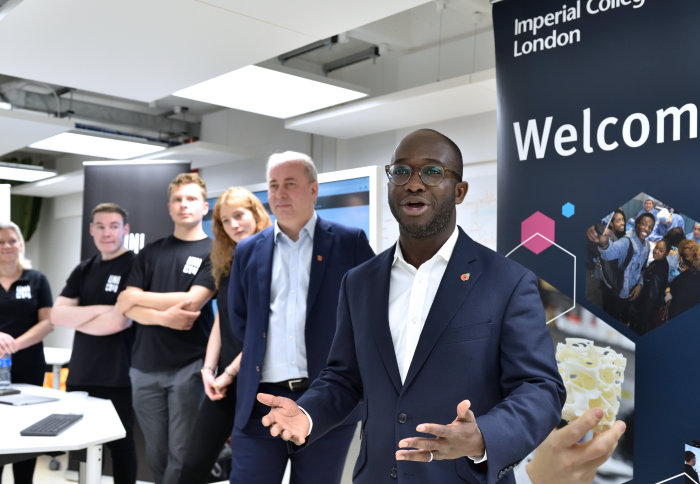Universities Minister joins education app showcase at Imperial Enterprise Lab

Universities and Science Minister Sam Gyimah MP welcomed the competitors and guests
The Universities Minister visited the Imperial Enterprise Lab on Thursday to kick-start the next phase of a government-led competition.
Universities and Science Minister Sam Gyimah MP visited Imperial’s Enterprise Lab to launch the second phase of the Department for Education’s Higher Education Open Data Competition, which is supporting the development of digital tools to help young people make more informed choices about university.
The Minister was welcomed to the Lab – Imperial’s flagship centre for student innovators and entrepreneurs – by Imperial’s Vice-Provost (Research and Enterprise) Professor Nick Jennings.
Helping young people chart a course
The College hosted a showcase of innovative digital projects developed through the competition, which was launched by Sam Gyimah in June 2016 and is being run through Innovate UK’s Small Business Research Initiative.
More than 40 applications were received and an external judging panel whittled them down to a shortlist of five, all of whom received a £25,000 prize to design their prototypes of digital tools that aim to use graduate outcomes data and other open datasets to help prospective students make informed choices of where and what to study.

Addressing the five teams, the Minister commended the level of student engagement that has gone into the prototypes: “it’s often easy to forget that when you’re talking about policy, actually the people that should be the centre of the policy are people who you want to benefit. The user experiences have really come through in the prototypes that you have built.”
The Universities Minister went on to pose the question: “a good degree is worth the investment, but what if you don’t understand what the different degrees are?” The competition, he said, is about “helping people to choose the path that is right for them.”

Tech company ‘The Profs’, one of the startups showcasing at the event, was co-founded by alumnus Leo Evans, who spent eleven years at Imperial. The entrepreneur first came to Imperial in 2003 to study Physics as an undergraduate, before undertaking an MSc in Finance at Imperial College Business School. After this, Leo went on to take a PhD in Financial Economics before lecturing at the Business School.
Imperial feels like home to me Leo Evans Co-founder, The Profs
Leo said “what really matters is that you have the Government backing EdTech. It’s a grass roots movement and a small community.” Leo also said he was so pleased with Imperial’s involvement, an institution that for him feels like home.
His tuition company and education consultancy is creating a digital tool that gamifies university and careers choices. Of the company’s 1000 tutors, almost 100 are Imperial students or graduates.
The Profs were joined by four competitors hoping to win the competition. AccessEd is a social enterprise that exists to widen access to university for students regardless of their background through their ‘personalised careers assistant’ ThinkUni.
Swipe left, swipe right
Course Match is an app with a swipeable interface that has information such as salary information and graduate outcomes data for prospective students on easy-to-digest course cards. Sixth formers can swipe left to ditch courses they’re not interested in, and swipe right to save interesting ones to their account.
MyEd is a research engine already helping parents and students quickly navigate comprehensive information and advice on all stages of education. Their tool, MyEd UniPlaces, will help students find prospective courses most compatible with their needs, requirements and preferences.

UNI4U, in collaboration with HiveIT, is developing a web-based tool to match students with their ideal university, taking into account their learning style, social interests and career aspirations.
The Minister used the opportunity to launch the second phase of the competition, in which the Department for Education is set to make two awards of up to £150,000 to two of the phase one winners to develop a fully functioning digital tool. Mr Gyimah finished by noting the success of the event: “What has been incredibly compelling today has been that firstly there is clearly a market opportunity here and secondly there is a real need for students.”
It is hugely important that students can use data to make informed decisions Professor Nick Jennings Vice-Provost (Research and Enterprise)
Professor Jennings praised the “fantastic activity”, adding that as a parent of a university student himself, he understands how it can be difficult for students to come by good data for making choices about university. As a Professor of Artificial Intelligence, he said it is “hugely important for students to use data to make informed decisions.”
Professor Jennings added that hosting this event at the Enterprise Lab was particularly fitting: “This Lab brings our students together to understand and participate in entrepreneurial activities and understand what’s involved in forming a company.”

The event was also attended by Imperial staff and students, representatives from UCAS, and school pupils from London and Grimsby, who were able to give the apps a spin before being given a tour of the South Kensington campus by one of the College’s President’s Ambassadors.

Imperial’s Director of Entrepreneurship, Ben Mumby-Croft, also joined the morning’s showcase. He said: “We’re delighted to welcome the Minister to the Lab and it’s fantastic to see the Department for Education running an innovative accelerator style competition of this kind to find novel, creative and engaging ways of using open data to help prospective students choose the right course for them.
“As an institution, Imperial is passionate about inspiring, educating and nurturing the next generation of student innovators and entrepreneurs, which made it particularly rewarding to see an alumni team showcasing their idea as part of the final five.”
Article text (excluding photos or graphics) © Imperial College London.
Photos and graphics subject to third party copyright used with permission or © Imperial College London.
Reporter
George Hope
Office of the President
Tom Rutland
Communications and Public Affairs